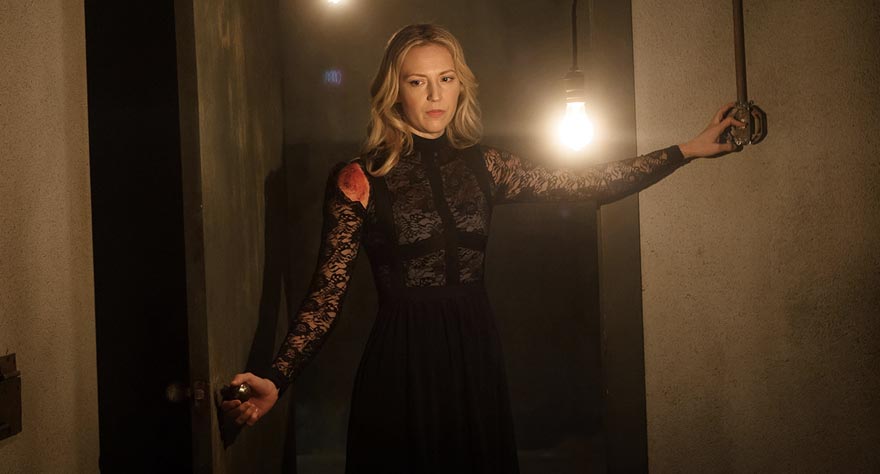
The wicked twist proves to be more of a gimmick bookended by cliché before it and monotony after.

The wicked twist proves to be more of a gimmick bookended by cliché before it and monotony after.
I was doing some research on plot twists in movies and the majority of the lists feature movies that have plot twists that occur at the end. I won’t list them all, but films like The Sixth Sense, Psycho, and Sleepaway Camp are a few examples of films where the surprise comes so late, it makes the viewer reconsider everything that happened before it (and maybe even inspire a re-watch of the film to look for missed clues). In director Adam Schindler‘s new thriller, Intruders, the twist doesn’t want a re-watch, it wants the viewer’s attention as soon as possible, occurring early in the film.
Beth Riesgraf plays Anna, a 20-something young woman living with, and caring for, her sick brother, Conrad (Timothy T. McKinney). Anna is trapped in her own home by acute agoraphobia. But one of the few other people she has contact with is the young man (Rory Culkin) who delivers daily prepared meals to the parentless siblings. When her brother dies, Anna inherits a considerable sum of money, left to her entirely in cash. A trio of thugs (Jack Kesy, Joshua Mikel, and Martin Starr) catch wind of this windfall and attempt to break into the home. But they didn’t account for her agoraphobia keeping her home. While the thieves turn the house upside-down looking for the cash, Anna turns the tables on them and the terrorizers become the terrified.
Early on, Intruders looks as if it’s going to be just another home invasion thriller. After the set-up leaves the protagonist physically trapped (by agoraphobia) and emotionally vulnerable (sad because of her brother’s death), she spends the better part of the rest of the film trying to outwit her attackers while overcoming her own personal issues. It’s pretty comparable to Panic Room in that way.
To get to the twist, one must first tolerate the clichéd first act (although, to be fair, that cliché helps make the twist all the more twisted). It starts out well, but once the dimensionally bereft bad guys appear (the Alpha Male, his weaker brother, and the sadist), Schindler’s direction becomes more of a stale paint-by-numbers. Still, the early going has its bright spots, led by veteran Riesgraf, who gives a terrific performance as the grieving sister and trapped agoraphobe. Another veteran—from the other side of the camera—is set decorator John Gathright, whose eye for detail allows Anna’s house to say a lot about her fragile psyche.
Then the twist happens.
I’ll issue the Spoiler Alert now, since the twist is its selling point. Without it, the film is just another home invasion thriller. In fact, not only does the twist happen early in Intruders, it’s sold about halfway through the trailer as the reason to see the film in the first place. You have now been warned.
The twist is that the basement of Anna’s house is something of an underground prison and torture chamber. It’s complete with retracting stairs to trap people in the basement, an assortment of instruments designed to deliver pain, and a few other unsettling things best not mentioned here. Anna knows her way around all these things, giving her something of a Jekyll/Hyde persona, only softly sinister. It’s a delicious twist, offering the viewer everything from the refreshing sight of a power struggle shifting to the woman’s favor (instead of the man’s), to the relief that the film is not just another home invasion thriller. Riesgraf revs up her performance here, turning out her character’s lifetime of psychological oppression into a measured burn.
That’s the good news.
The bad news is once the twist happens and the viewer’s excitement is ignited about the endless possibilities these turned tables offer. Intruders quickly disintegrates and exposes itself as having no real possibilities. The drop-off is jarring. Once the trio of intruders (and that delivery boy, too) are in the basement, what more is there to do other than have the woman terrorize the men? Once that trick is played the first time, the film can only manage to limp along as home invasion thriller-turned-torture horror. The only maintaining interest is wanting to know why this frightful basement exists. It’s explained, and quite satisfactorily. But that explanation should be the reward; instead, it’s the consolation prize.
Hollywood is a town full of bad ideas. So when a great one comes along but is poorly executed, it’s more than an opportunity missed, it’s an opportunity wasted. With Intruders (previously titled Shut In), director Schindler and screenwriters T.J. Cimfel and David White prove to be another in a long line of filmmakers guilty of being so enamored by the originality of their twist, they simply let that twist try to carry them instead of building a strong showcase around it.